We conducted a premature ejaculation study to better understand how premature ejaculation impacts the lives of patients and what treatment methods they use to cure it.
Before I jump to the results, let me quickly explain the methodology:
- Population: Men suffering from premature ejaculation in California, US
- Sampling technique: Snowball sampling
- Total number of respondents: 327
- Location of respondents: California, US
- Gender: Male
- Medical condition: All the respondents had premature ejaculation
- Data collection technique: Survey
- Questionnaire type: Self-administered questionnaire included 15 items that included 5-point Likert scale (8 items), closed-ended MCQs (3), and open-ended MCQs (4 items)
- Survey administration: We contacted respondents initially via referrer (through phone or email) for their consent for participation in the study. Questionnaires were sent to interested participants in three ways (based on their preference): Online, mail, or in-person
- Data analysis tools: Microsoft Excel and SPSS.
The study had three key purposes:
- How aware premature ejaculation sufferers are about their condition?
- How premature ejaculation impacts the sex life of the patients?
- How do men treat premature ejaculation and with what efficacy?
The results revealed a lot about premature ejaculation and how it impacts your relationship and life. Here is an overview of key findings of the study:
Table of Contents
1. Premature Ejaculation is Common Across All Age Groups
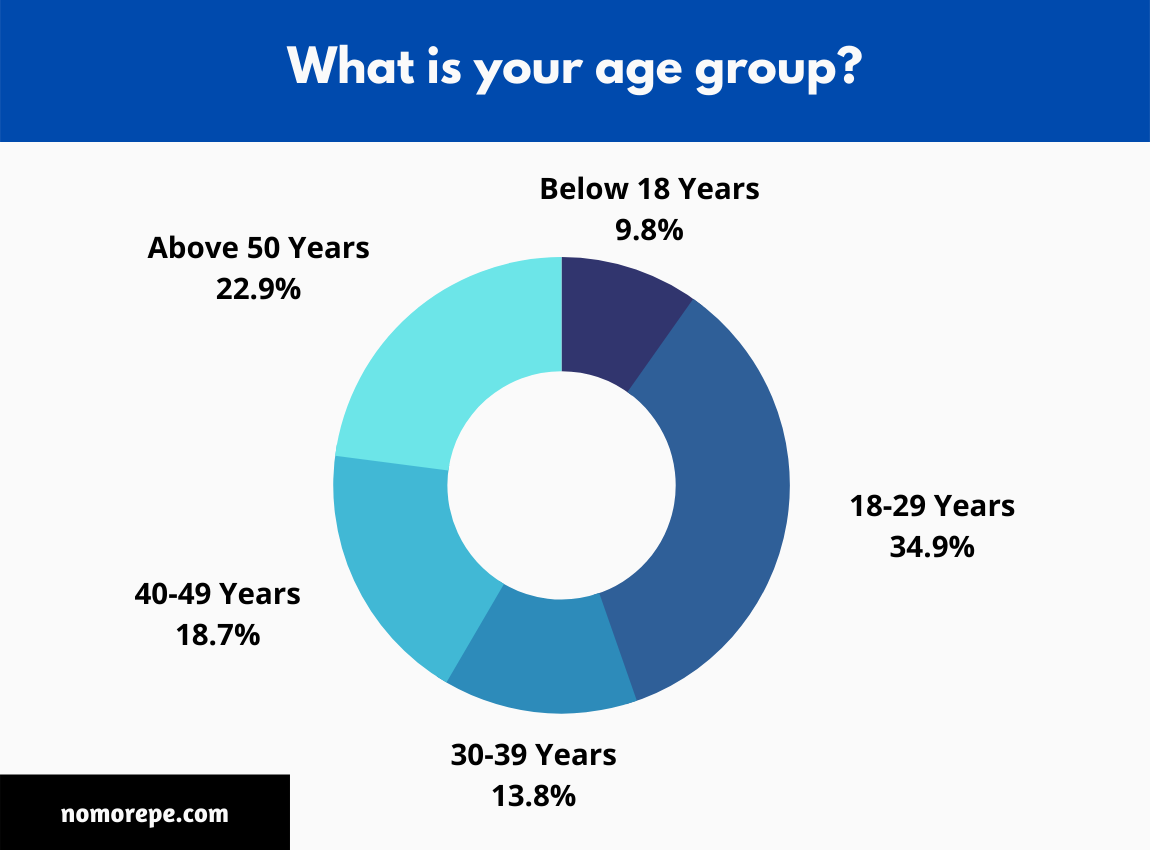
The majority of the respondents were between 18-29 years (35%). The study covered all the age groups right from teenagers to above 50 men.
Data shows that premature ejaculation isn’t age-dependent. It can occur at any time irrespective of your age. However, it is more common in adults (18-29 years) and men who are above 50. Surprisingly, 10% of respondents in the study were teens who were suffering from premature ejaculation. This shows teenagers can also suffer from premature ejaculation.
2. 61% of Men Suffering from Premature Ejaculation Know What It Is
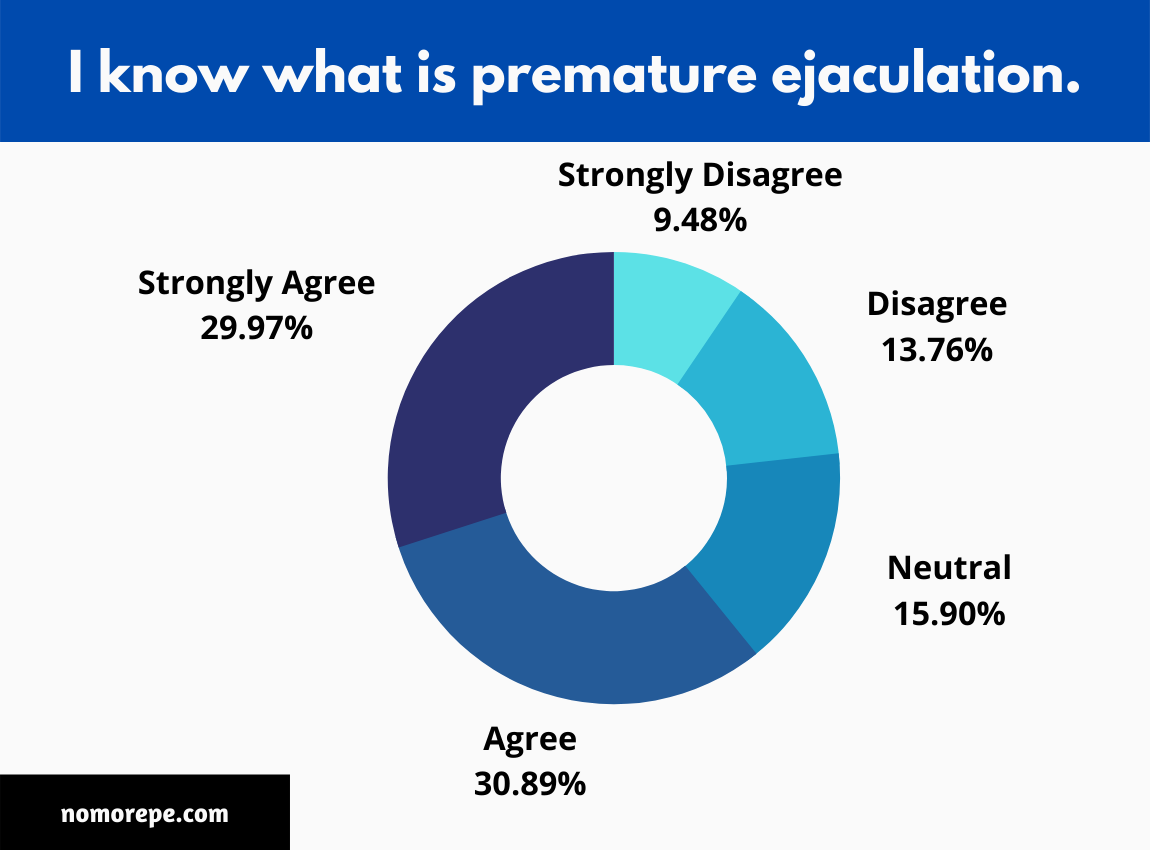
The majority of the men suffering from premature ejaculation know what it is. Almost 61% of men reported that they agree or strongly agree to the statement: I know what is premature ejaculation.
However, 23% of men suffering from premature ejaculation don’t know what this sexual disorder is and how it is related to their life. This is somewhat surprising.
Since 23% of the respondents are above 50 and another 18.7% are between 40-49 years, it is highly likely that men in these age groups are least concerned about premature ejaculation. They consider erectile dysfunction, premature ejaculation, and other sexual disorders to be common (as most sex issues are positively related to age). So, these age groups might not know what premature ejaculation is as they consider it to be a part of their life.
3. 74% of Men Aren’t Comfortable Sharing Their Sexual Problems with An Expert
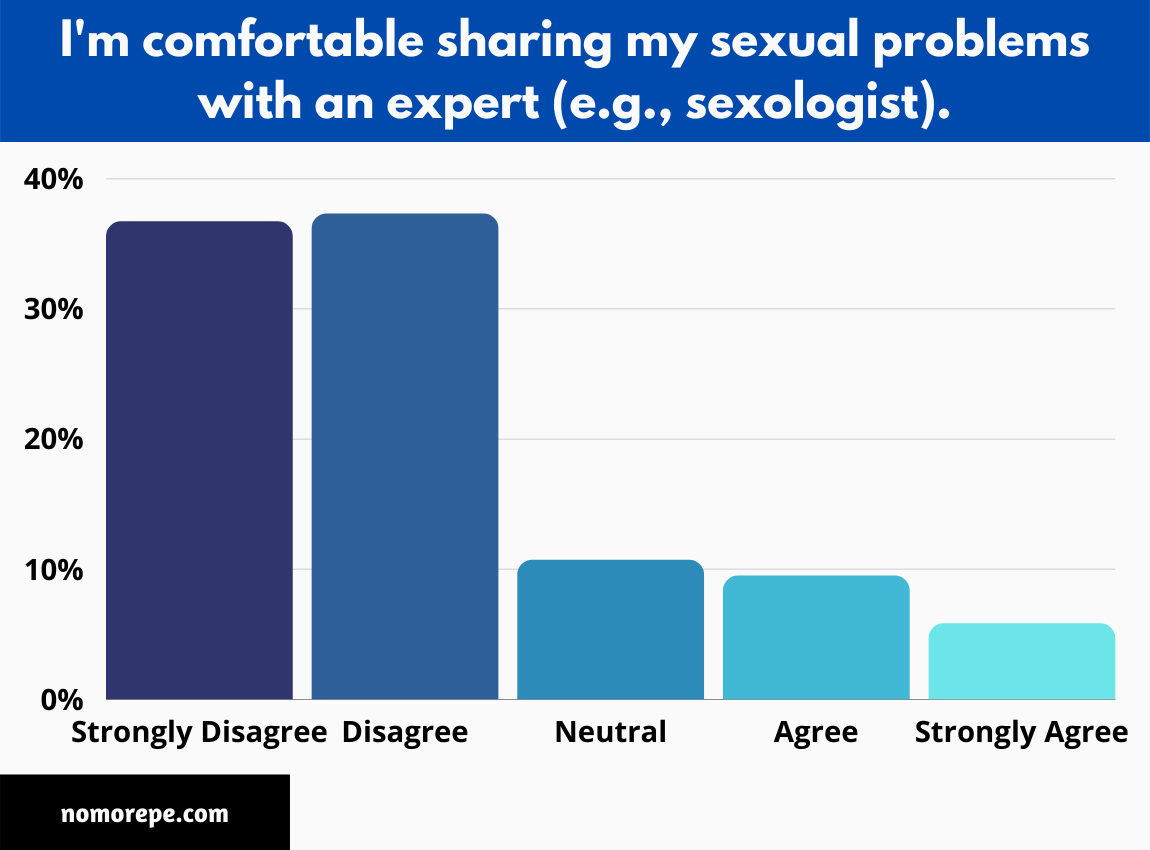
Men don’t prefer sharing their premature ejaculation condition with medical experts. As much as 74.01% of respondents strongly disagree or disagree with the following statement: I’m comfortable sharing my sexual problems with an expert (e.g., sexologist).
Only 15.29% of men are comfortable sharing their sexual issues with experts.
This implies that the majority of men don’t take prescription medication as they’re reluctant to share their condition with an expert. Eventually, they have to use OTC pills or other techniques to cure premature ejaculation.
4. 64% of Men Aren’t Comfortable Sharing Sexual Problems with Their Sex Partners
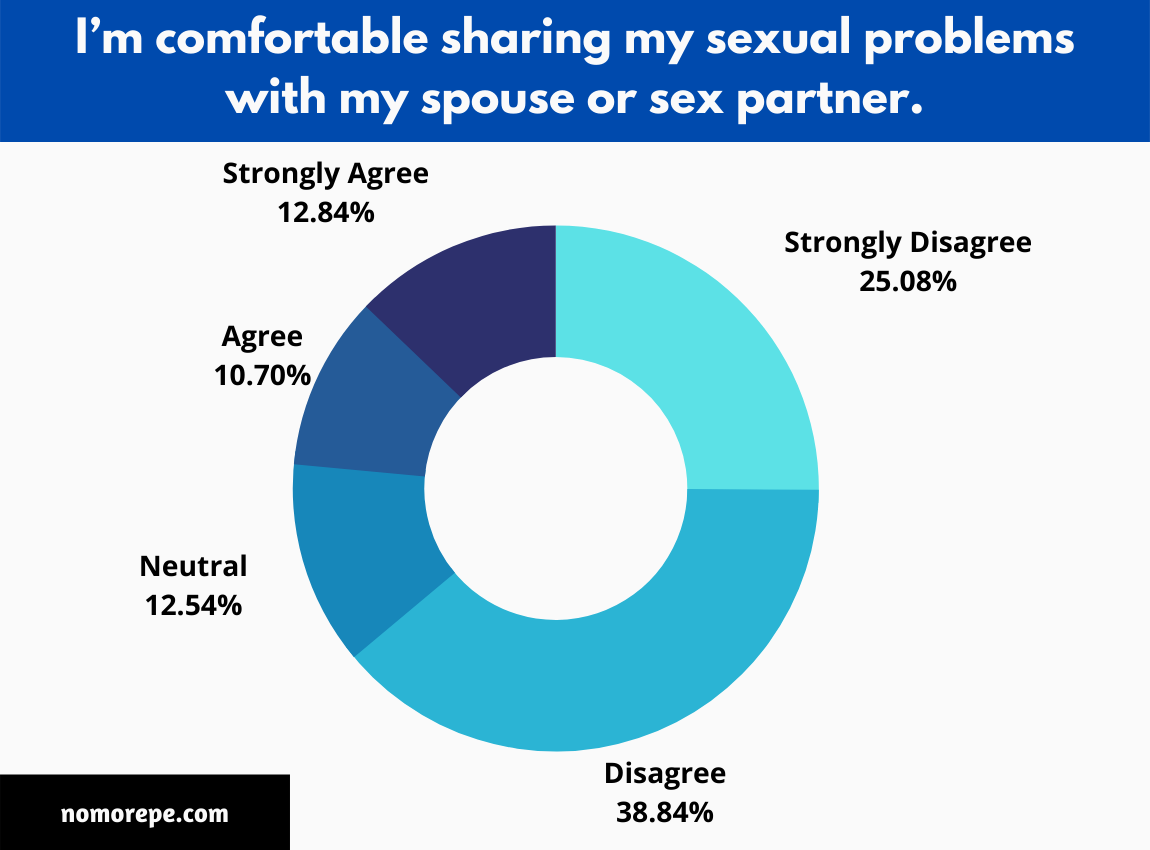
The discomfort that men face due to premature ejaculation isn’t just limited to medical experts. 63.91% of men who suffer from premature ejaculation reported that they aren’t comfortable sharing their condition with their sex partner or spouse.
Only 23.55% of men reported that they agree or strongly agree with this statement: I’m comfortable sharing my sexual problems with my spouse or sex partner.
We didn’t explicitly ask about premature ejaculation for two reasons:
- Only men who have premature ejaculation were part of the study so it’s evident that they’re referring to their sexual problem which is premature ejaculation
- We were more interested in understanding the comfort and trust level of premature ejaculation patients with their (sex) partners. They might have some other sex problem too (other than PE), so we wanted to confirm if they comfortably share it.
5. 80% of Men Feel Embarrassed Discussing Their Premature Ejaculation with Others
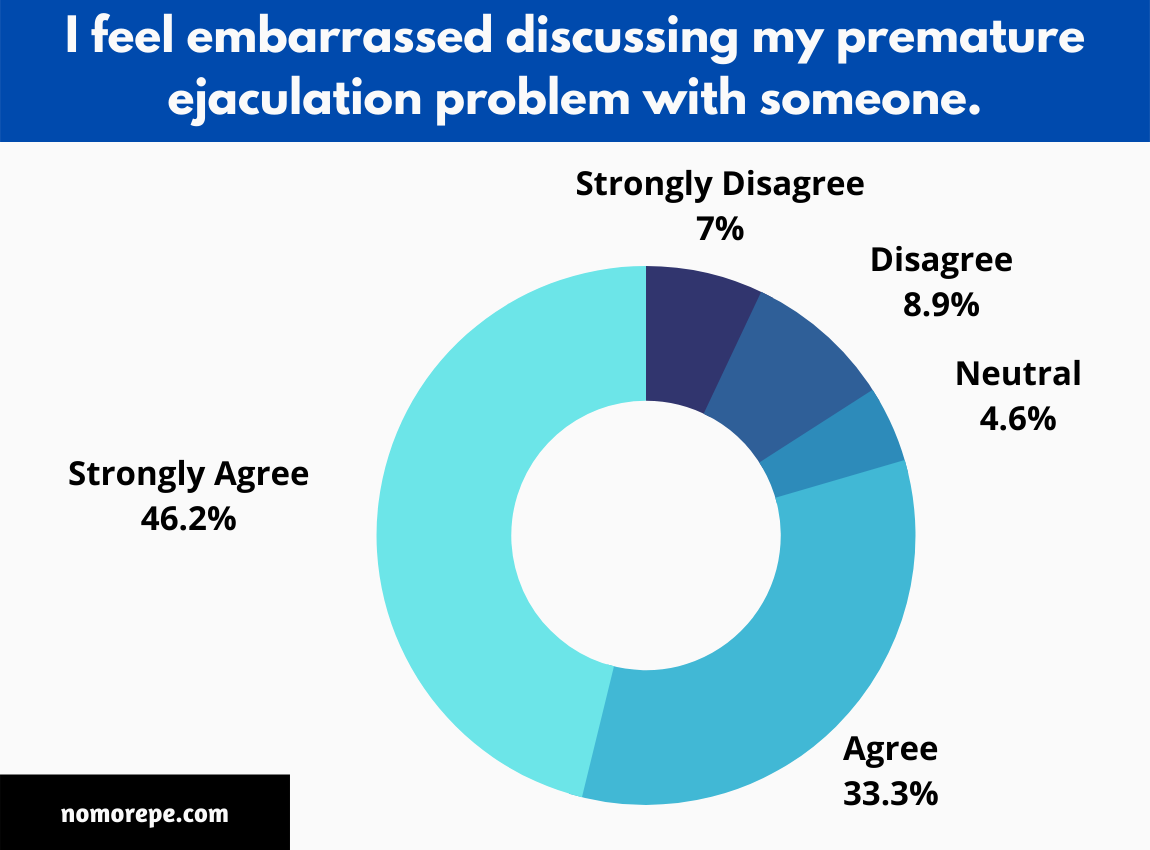
Embarrassment is a serious concern for men suffering from premature ejaculation. We asked the following question from the respondents: I feel embarrassed discussing my premature ejaculation problem with someone.
79.51% of men responded with strongly agree or agree to this statement while 15.90% of men reported that they strongly disagree or disagree with the statement.
This embarrassment leads to a lack of communication and creates barriers. It also indicates taboos developed in our society around impotency and sexual disorders in men.
6. 92% of Men Can Distinguish Between Normal and Early Ejaculation
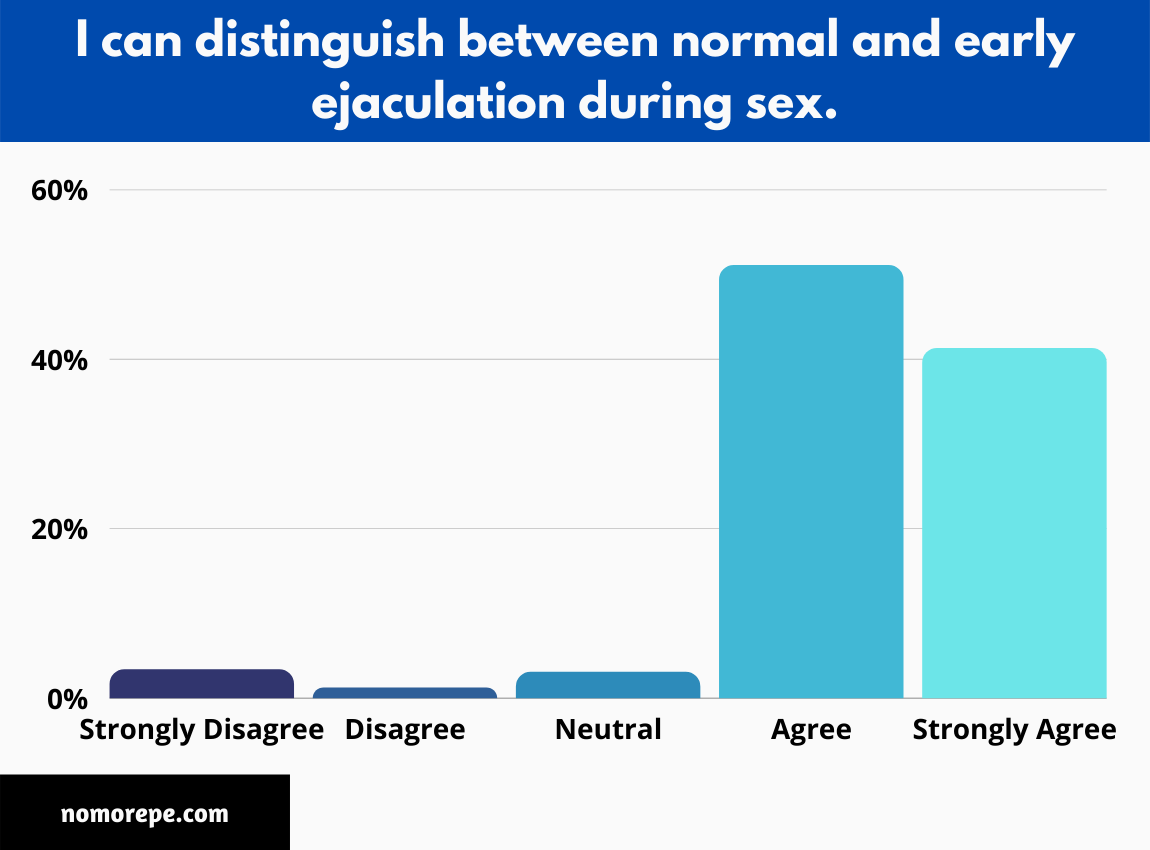
The PE patients need to understand normal and early ejaculation during sex as this helps them figure out where they stand. 92.35% of respondents in our survey say that they strongly agree or agree to the following statement: I can distinguish between normal and early ejaculation during sex.
This means the majority of premature ejaculation sufferers can differentiate between normal and early ejaculation. This is helpful in several ways such as:
- Medical history
- Identification of the type of premature ejaculation
- Identifying variations
- Finding intravaginal ejaculation latency time (IELT) is almost always needed when seeking help from an expert
- Personal satisfaction.
7. 35% of Men Hide Their Premature Ejaculation Problem from Sex Partners
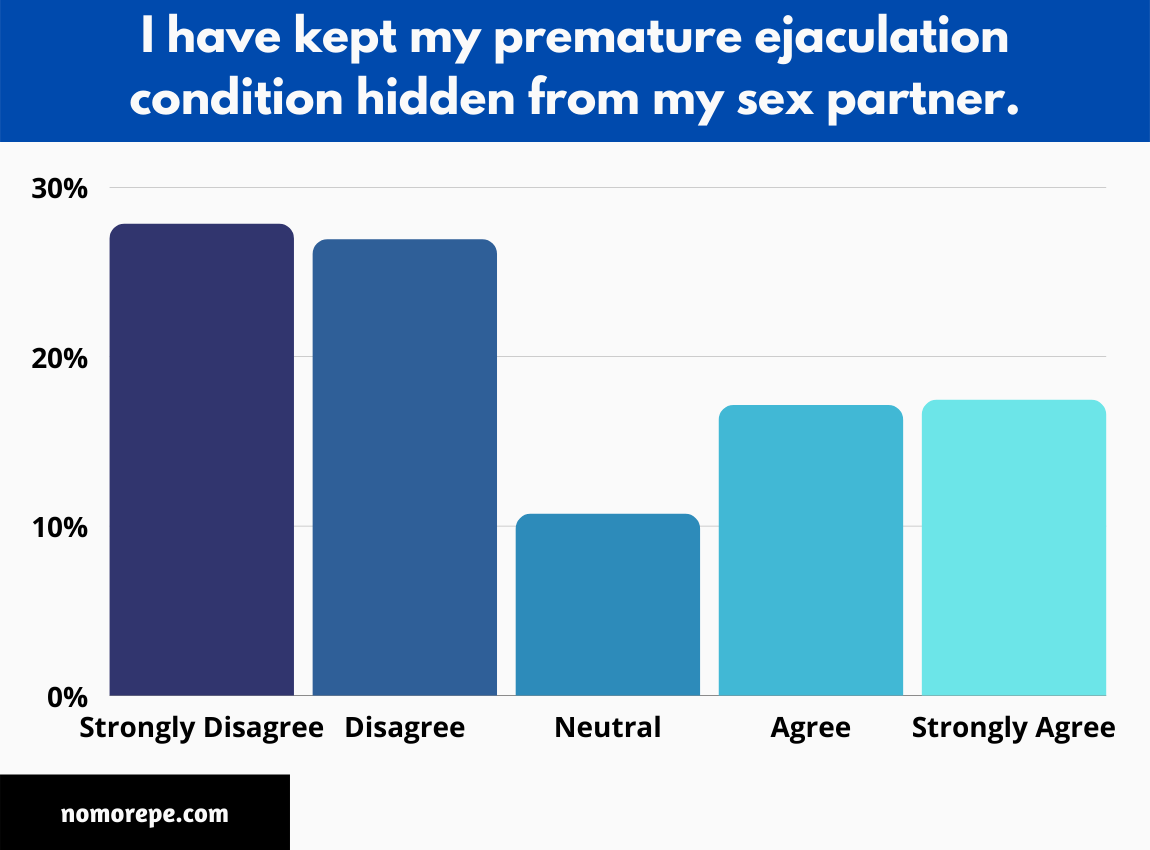
Surprisingly, 34.56% of men hide premature ejaculation from their sex partners while 54.74% don’t. The majority of the respondents reported with strongly disagree or disagree with the following statement: I have kept my premature ejaculation condition hidden from my sex partner.
Acquired premature ejaculation is easy to hide as it happens on and off and is controllable to a great extent. Lifelong premature ejaculation is something you can’t hide from your sex partner or spouse. So, we can argue that men who hide their PE problem from their partners are those who either have acquired or normal variable premature ejaculation.
8. 91% of Men Suffering from Premature Ejaculation Don’t Enjoy Sexual Intercourse
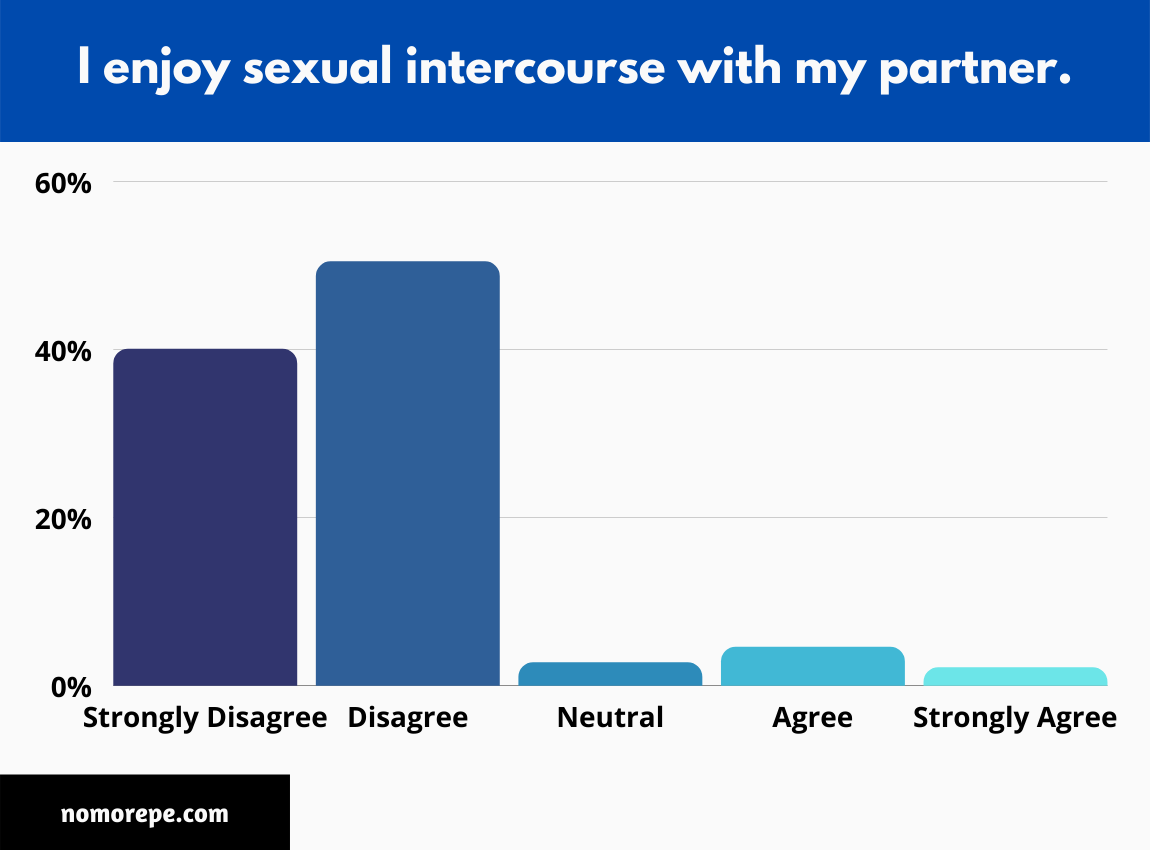
A whopping 90.52% of men say that they don’t enjoy sexual intercourse with their partners. The majority of the respondents selected strongly disagree or disagree with the following statement: I enjoy sexual intercourse with my partner.
This indicates the frustration premature ejaculation sufferers face. It is hard for them to enjoy sex. Only a measly 6.73% of men agreed or strongly agreed to the above statement.
9. 79% of Men Say Their Sexual Partners Don’t Enjoy Sex Due to Premature Ejaculation
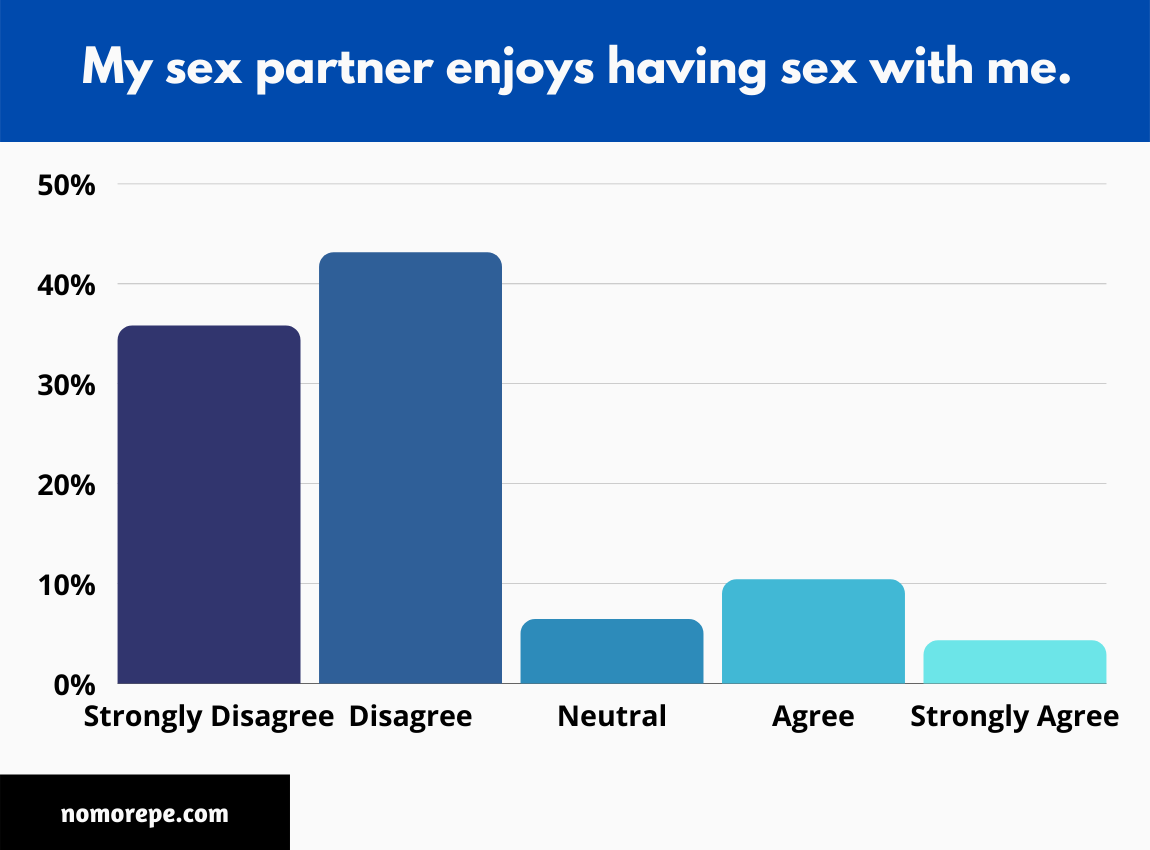
It isn’t just about the premature ejaculation patient but their sexual partners don’t enjoy sex too. 78.90% of men said that they either strongly disagree or disagree with the following statement: My sex partner enjoys having sex with me.
This shows that premature ejaculation doesn’t just impact males but female partners also have to face negative consequences.
10. 42% of Men Diagnosed with Premature Ejaculation Aren’t in Any Sexual Relationship
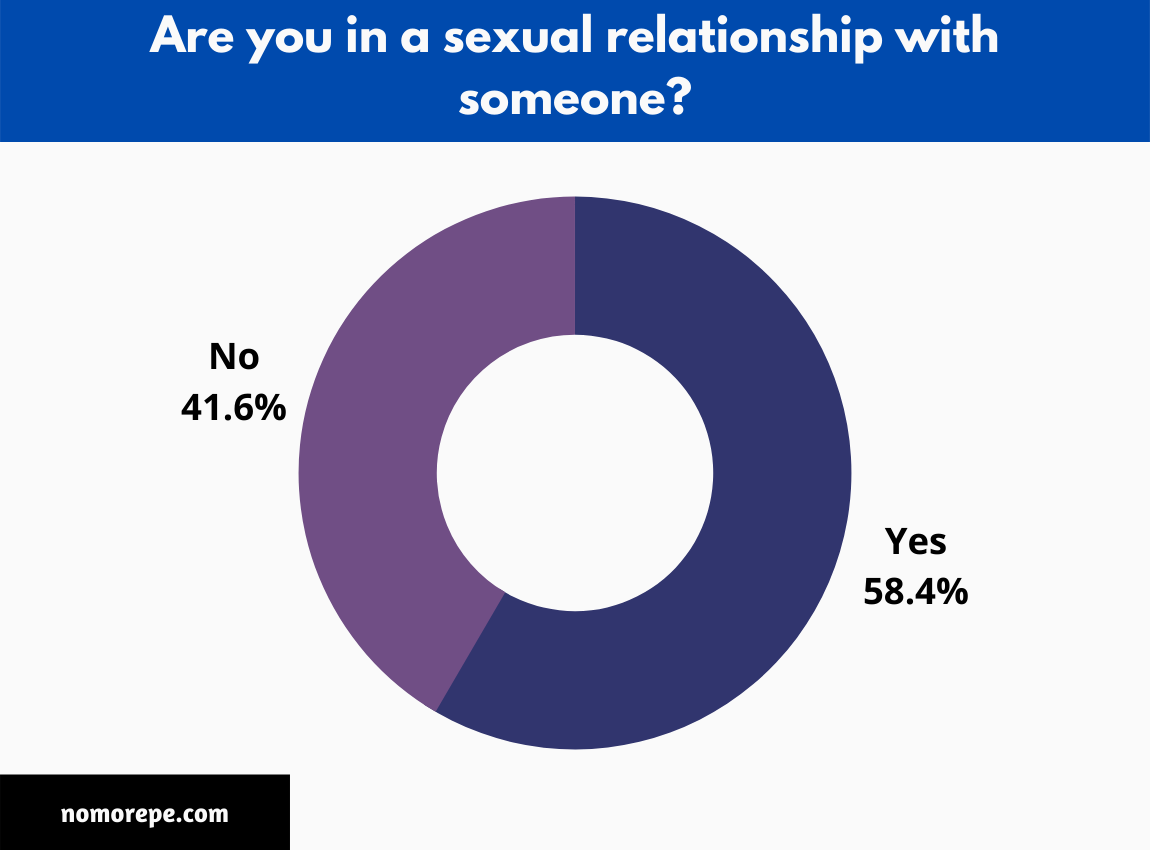
Only 58.4% of men reported that they’re currently in a sexual relationship with someone while 41.6% of respondents weren’t involved in any sexual relationship.
Premature ejaculation impacts your relationships to an extent you might have to end sexual relationships. Since you and your partner can’t enjoy sexual intercourse due to PE, this leads to relationship issues and breakups.
11. 94% of Premature Ejaculation Patients Have Ejaculation Time Under 60 Seconds
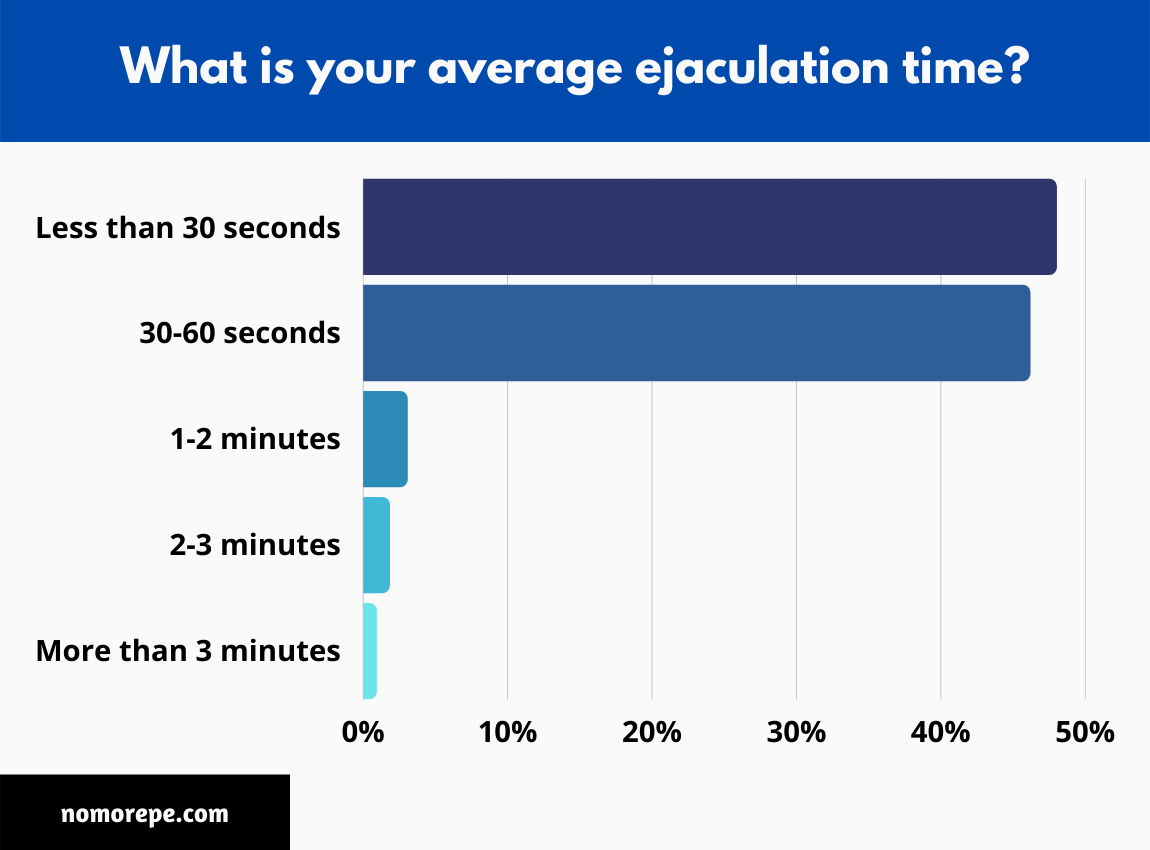
The majority of respondents reported that their average ejaculation time is less than a minute. 48.01% of men ejaculate in less than 30 seconds and 46.18% of men ejaculate between 30-60 seconds. Around 3% of respondents said that their average ejaculation time is between 1-2 minutes.
This is consistent with the previous research and definition of premature ejaculation.
12. Relationship Issues is the Biggest Challenge Premature Ejaculation Sufferers Face
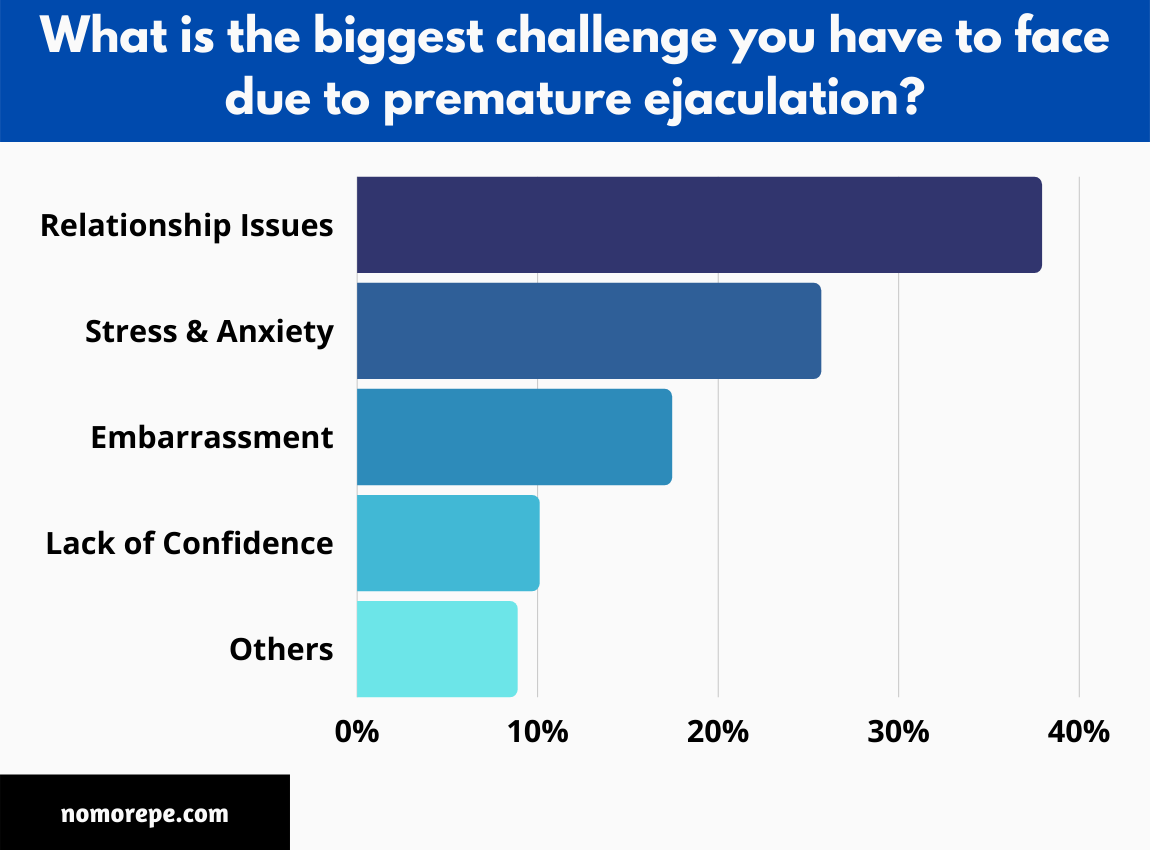
We asked the participants to pick the biggest challenge they have to face due to premature ejaculation from 4 options. And we also allowed them to write any other challenge that isn’t on the list.
37.92% of men reported “relationship issues” as their top challenge followed by “stress and anxiety” which was a top challenge for 25.69% of men. “Embarrassment” was the biggest challenge of 17.43% of men and “lack of confidence” was reported by 10.09% of men as their top challenge.
13. 38% of Men Suffering from Premature Ejaculation Use Over-the-Counter Pills
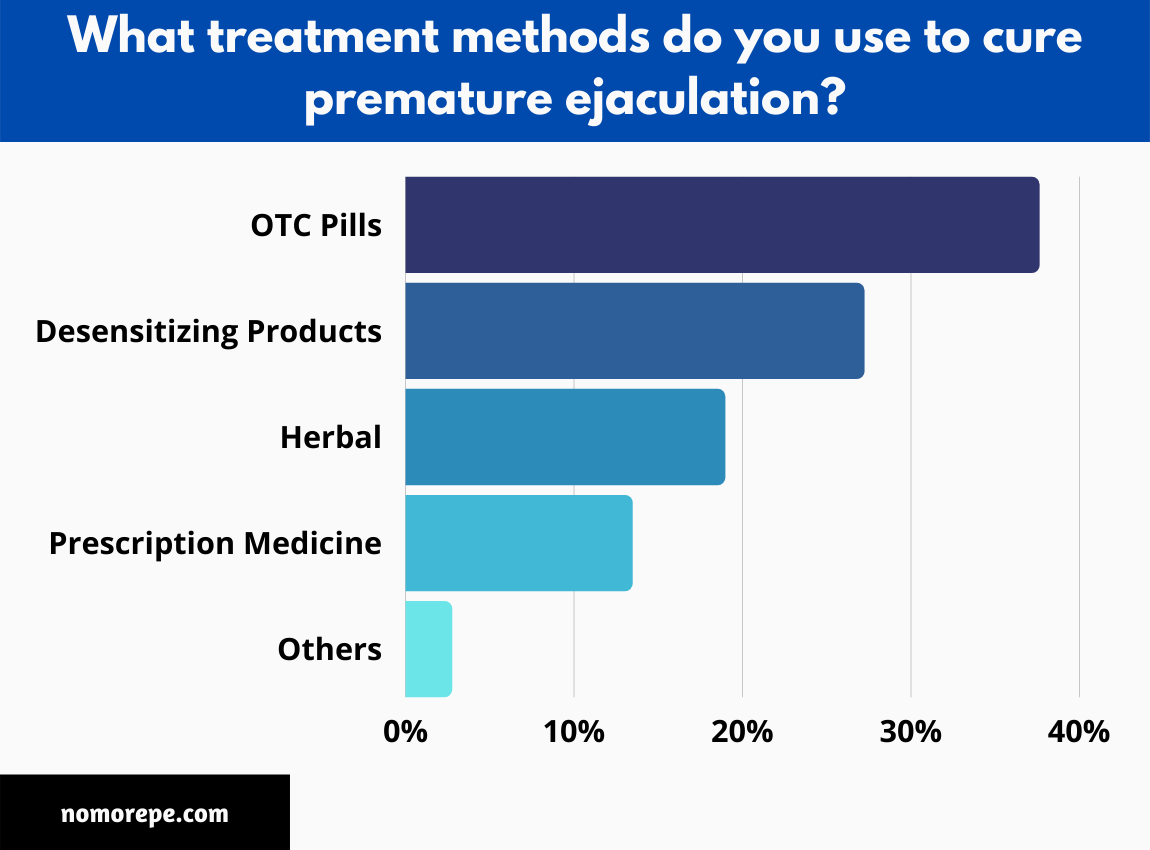
The most used premature ejaculation treatment by men is OTC pills. 37.61% of men say that they use OTC pills to cure premature ejaculation, 27.22% of men use desensitizing products (e.g., delay sprays), 18.96% of men use herbal treatment methods, 13.46% of men use prescription medicine, and 2.75% of men use other treatment methods to cure premature ejaculation.
This is consistent with the previous result. As 74% of men aren’t comfortable sharing their sexual problem with an expert and 79.51% of men feel embarrassed discussing their PE issue with someone, men prefer treatment methods that they can use without telling someone about their disease. Consequently, prescription medicine is the least favorable treatment method as it requires men to consult an expert.
14. 36% of Premature Ejaculation Patients Rate Desensitizing Products as the Most Effective Treatment Method
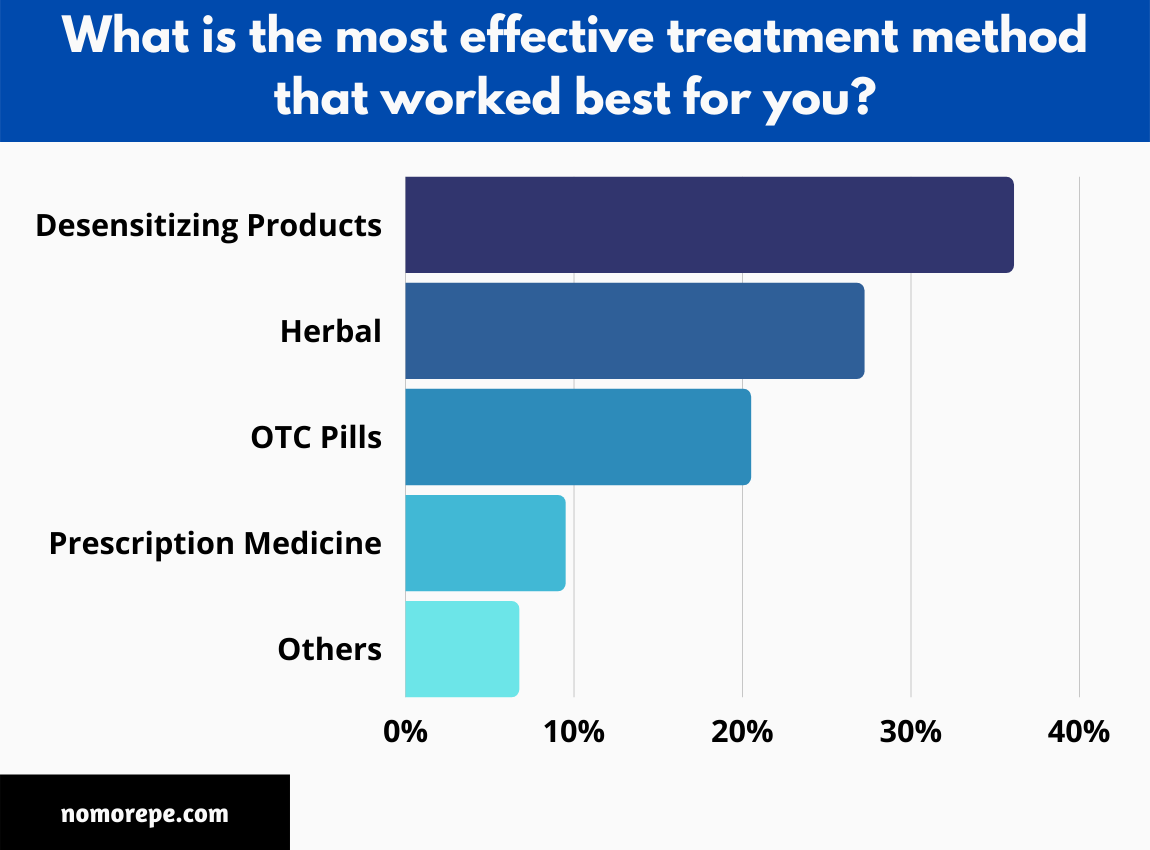
Desensitizing or numbing products were reported to be most effective in curing premature ejaculation. 36.09% of premature ejaculation patients reported that desensitizing products were most effective and worked best for them. Herbal treatment works best for 27.22% of men, OTC pills work best for 20.49% of men, and prescription medicine works best for 9.48% of men.
The reason why desensitizing products are most effective in curing premature ejaculation is that the majority of the men were suffering from acquired premature ejaculation (as discussed above) and it gets easier to treat it with numbing products.
15. 31% of Men Say Food Has Helped Them Delay Ejaculation
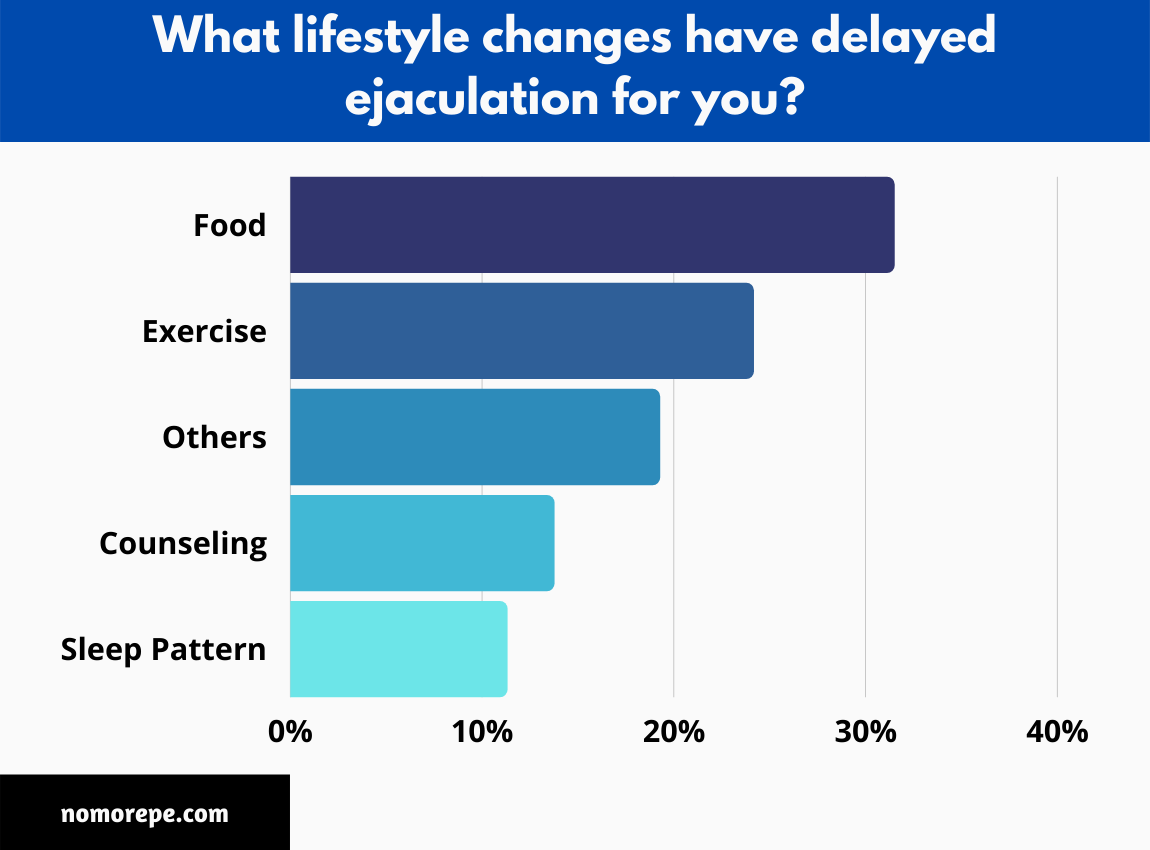
We asked the following question from respondents to identify lifestyle changes that help in delaying ejaculation: What lifestyle changes have delayed ejaculation for you?
Food was reported to be most effective in delaying ejaculation. 31.50% of men reported that food helped them delay ejaculation. Exercise helped 24.16% of men in controlling ejaculation problems, other lifestyle changes helped 19.27% of men, counseling was useful for 13.76% of men, and sleep pattern was effective in delaying ejaculation for 11.31% of men.
Other lifestyle changes (as reported by respondents) included:
- Vacations
- Detox
- Changing intercourse timing.
Conclusion
This premature ejaculation study highlights and identifies some major challenges that rapid ejaculation sufferers have to face on a daily basis. Constant embarrassment, inability to enjoy sexual intercourse, uncomfortable feeling in sharing and discussing sexual issues with experts, and relationship issues are the biggest downsides of this sexual disorder.
OTC pills, desensitizing products, and food changes are the most effective treatment methods for premature ejaculation. But how effective these methods are and how they impact delay time is still unknown.
In general, men suffering from premature ejaculation know what it is and are aware of the ins and outs of the problem. Future research will reveal more insights into what age groups are more concerned about ejaculation timing.
Future studies need to find relationships between social issues that these men face and their age. Clearly demonstrating how PE related issues relate to age can help us address them effectively.

